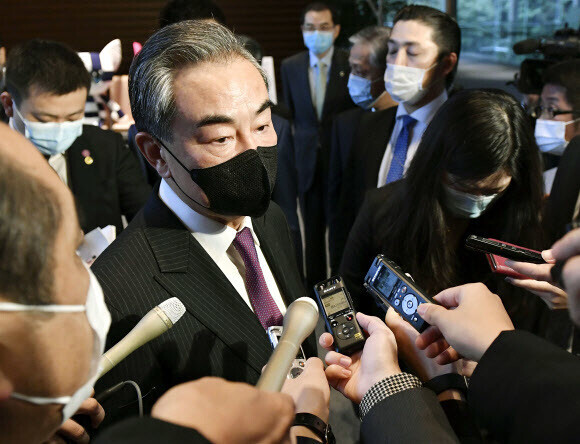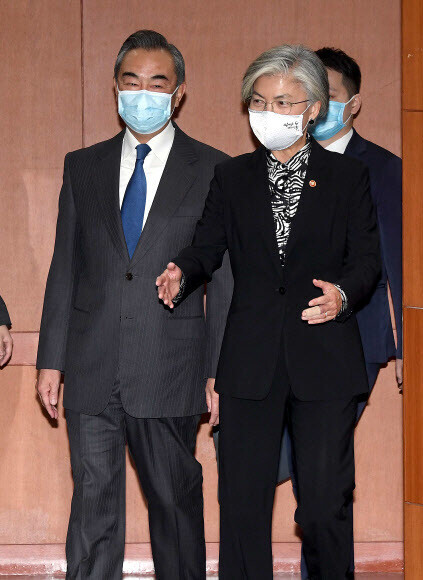hankyoreh
Links to other country sites 다른 나라 사이트 링크
Wang Yi said S. Korea and China should “look out for each other and provide mutual assistance”

During a tour of Northeast Asia, Chinese Foreign Minister Wang Yi used different idiomatic phrases to refer to Japan and South Korea. Wang described Japan as “yi yi dai shui,” literally “separated by a stream,” and often used for close neighbors. But referring to South Korea, Wang used the phrase “shou wang xiang zhu,” literally “keeping watch and providing mutual assistance,” signifying friends who look after each other in times of trouble.
The phrases are notable since they express, with relative clarity, China’s strategic perspective on its two neighbors.
On the morning of Nov. 26, Wang held a meeting with South Korean Foreign Minister Kang Kyung-wha at the Ministry of Foreign Affairs headquarters in Seoul. It was the first meeting between the two countries’ top diplomats in a year.
The phrase “shou wang xiang zhu” came up in Wang’s opening remarks before the meeting. “Since the outbreak of the COVID-19 pandemic, the people of China and South Korea have helped each other through a spirit of mutual assistance [shou wang xiang zhu]. I would like to take this opportunity to express my gratitude for all the help and support with which various Korean sectors provided the Chinese people when we were facing difficulties because of the COVID-19 outbreak.”
“As strategic cooperative partners, China and South Korea continue to contribute in their respective capacities to arranging regional and international cooperation, defending the peace and stability of the region, and compensating for shortcomings in the global system as a whole,” Wang said.
The striking feature of Wang’s brief remarks was his reiteration of South Korea and China’s status as “strategic cooperative partners” through his use of the phrase “shou wang xiang zhou.” The phrase implies two parties who help each other out and look after each other while facing the same difficulty or enemy.
That same phrase was used by Chinese President Xi Jinping during a phone call with South Korean President Moon Jae-in on Feb. 20, along with the similar phrase “tong zhou gong ji,” which literally means “crossing the river in the same boat.” “We have collaborated and taken joint action in times of difficulty [shou wang xiang zhu]; as close neighbors, we have cooperated in unison and navigated challenges together [tong zhou gong ji],” Xi said.

That contrasts with the more muted language that Wang used during his meeting with Japanese Foreign Minister Toshimitsu Motegi on Nov. 24. “China and Japan’s relationship is that of close neighbors [yi yi dai shui] and partners who need to cooperate in the long term. We should carry out strategic cooperation whenever necessary,” the Chinese official said.
As far as China is concerned, South Korea and Japan’s “strategic positions” have been settled. South Korea is a “strategic partner” that China should cooperate with against common difficulties or enemies, while Japan is a neighbor that China should communicate with whenever necessary.
While the main subject of cooperation and action that China apparently has in mind is the COVID-19 crisis sweeping the globe, in other circumstances that could also be the US, given the strategy of encirclement it’s pursuing against China.
Conversely, the US has used the expression “cornerstone” to refer to Japan, its number-one ally in the Indo-Pacific region, and the expression “linchpin” to refer to South Korea, its number-two ally there.
Mention of potential visit by Xi JinpingWhile speaking to reporters immediately after the meeting, Wang addressed the possibility of Chinese President Xi Jinping visiting South Korea, currently a question of keen interest for the two countries.
When reporters asked about the likelihood of Xi paying a visit before the end of the year, Wang said, “Diplomatic communication is currently underway. The important thing right now is to keep creating the conditions for such a visit.”
“All of you are wearing masks right now. That kind of thing has an effect,” Wang said, pointing to the masked reporters around him.
“We want this to happen quickly, too. We need to bolster exchange with each other. We’re neighboring countries.”
“There’s more to the world than the US,” Wang quipped when asked whether his tour of South Korea and Japan was connected with China’s rivalry with the US, without answering directly.
“In particular, South Korea and China need to strengthen cooperation on dealing with COVID-19, handling the economy and trade, defending the stability of the region and finding a peaceful solution to Korean Peninsula issues,” he said.
“We also need to hold fast to multilateralism, defend free trade and speed up negotiations for the second phase of the China-South Korea Free Trade Agreement. There’s so much that we need to do.”
By Gil Yun-hyung, staff reporter
Please direct comments or questions to [english@hani.co.kr]

Editorial・opinion
![[Column] Life on our Trisolaris [Column] Life on our Trisolaris](https://flexible.img.hani.co.kr/flexible/normal/500/300/imgdb/original/2024/0505/4817148682278544.jpg) [Column] Life on our Trisolaris
[Column] Life on our Trisolaris![[Editorial] Penalties for airing allegations against Korea’s first lady endanger free press [Editorial] Penalties for airing allegations against Korea’s first lady endanger free press](https://flexible.img.hani.co.kr/flexible/normal/500/300/imgdb/original/2024/0502/1817146398095106.jpg) [Editorial] Penalties for airing allegations against Korea’s first lady endanger free press
[Editorial] Penalties for airing allegations against Korea’s first lady endanger free press- [Editorial] Yoon must halt procurement of SM-3 interceptor missiles
- [Guest essay] Maybe Korea’s rapid population decline is an opportunity, not a crisis
- [Column] Can Yoon steer diplomacy with Russia, China back on track?
- [Column] Season 2 of special prosecutor probe may be coming to Korea soon
- [Column] Park Geun-hye déjà vu in Yoon Suk-yeol
- [Editorial] New weight of N. Korea’s nuclear threats makes dialogue all the more urgent
- [Guest essay] The real reason Korea’s new right wants to dub Rhee a founding father
- [Column] ‘Choson’: Is it time we start referring to N. Korea in its own terms?
Most viewed articles
- 1New sex-ed guidelines forbid teaching about homosexuality
- 260% of young Koreans see no need to have kids after marriage
- 3OECD upgrades Korea’s growth forecast from 2.2% to 2.6%
- 4[Column] Life on our Trisolaris
- 5[Guest essay] Maybe Korea’s rapid population decline is an opportunity, not a crisis
- 6Presidential office warns of veto in response to opposition passing special counsel probe act
- 7S. Korea discusses participation in defense development with AUKUS alliance
- 8Two lung cancer deaths at Samsung Electronics deemed occupational in nature
- 9Trump asks why US would defend Korea, hints at hiking Seoul’s defense cost burden
- 10Inside the law for a special counsel probe over a Korean Marine’s death